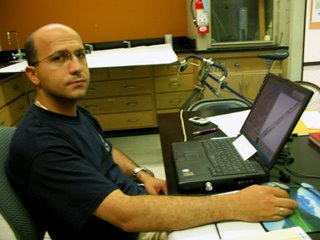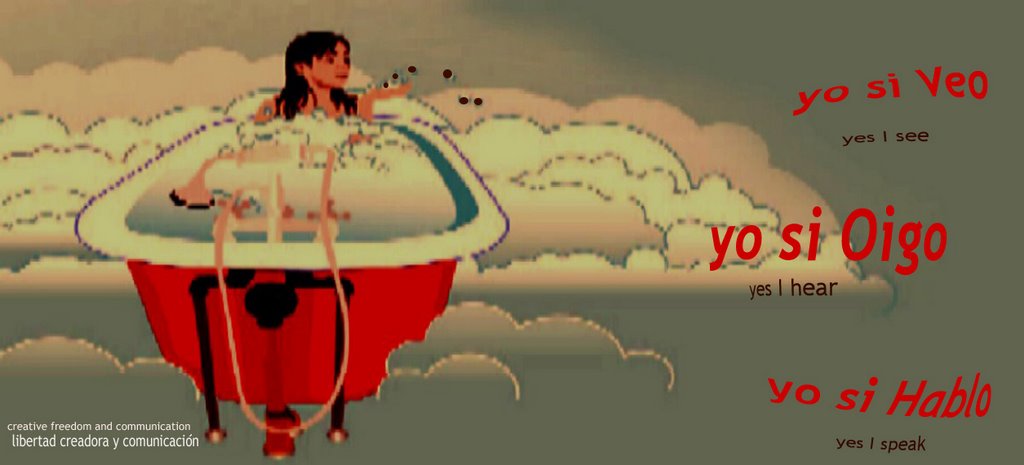Tony Nemer, a Lebanese working at MU, witness of the war:
“We knew how the war started but we never know how it is going to end”
 One month before Israel started the war in Lebanon on July 12th, this 32 years old man, a Post-doctoral Associate at the Department of Geological Sciences (University of Missouri-Columbia), traveled to his country to develop field investigations concerning earthquake potential in the Middle East and northwest Africa. It was also a opportunity for him to visit his family in Roum, within the Jezzine district, which lies at the northern end of south Lebanon, where he was born and his parent live currently. But Tony Nemer did not know he would come back to Columbia on August 2nd witnessing a war. His face mirrors the sorrow and worrying of leaving his people in such a condition, but fortunately also his strength as a go-getter is able to share with us his thought, feeling and experiences on this war. (Photo: Tony Nemer working in his office at the Department of Geological Science, University of Missouri-Columbia) One month before Israel started the war in Lebanon on July 12th, this 32 years old man, a Post-doctoral Associate at the Department of Geological Sciences (University of Missouri-Columbia), traveled to his country to develop field investigations concerning earthquake potential in the Middle East and northwest Africa. It was also a opportunity for him to visit his family in Roum, within the Jezzine district, which lies at the northern end of south Lebanon, where he was born and his parent live currently. But Tony Nemer did not know he would come back to Columbia on August 2nd witnessing a war. His face mirrors the sorrow and worrying of leaving his people in such a condition, but fortunately also his strength as a go-getter is able to share with us his thought, feeling and experiences on this war. (Photo: Tony Nemer working in his office at the Department of Geological Science, University of Missouri-Columbia)
Q. How was life in Lebanon before the Israel’s last attack?
A. People there were living in a normal fashion. The 4-million inhabitants were preparing themselves for a promising touristic season for this summer, on which the Lebanese economy relies mostly. Indeed we were expecting some 1,600,000 tourists for this season whereby a large part of Lebanese hotels were booked for the whole summer.
Q. How did your and your family life change when the attacks begun?
A. Everybody's life has changed since the whole mess started. In effect, what can one expect in a country when one quarter of its inhabitants is forced to displace? Our village is crowded now as many refugees moved in from nearby devastated places. My parents spend most of their times on the TV following up the different steps of this unfortunate war, especially that my father's business (a gas station) is being frozen now as very little gas is available now in the country and it is concentrated mainly in Beirut. As to my personal experience, I was in the middle of my geological field investigations when the war started on July 12th. Certainly, I had to stop my work and back up home as the bad situation started to escalate dramatically. As the Beirut international airport got hit by the strikes, I recognized that it's going to be a hard time for me to be back in the US as I had to travel by car to Jordan to take off from there.
Q. As a Lebanese, could you explain us how the political scene is in your country? And how is it in terms of relationships with neighboring countries and the U.S.A.?
A. Lebanon is a kind of a special country when it comes to politics as many elements get intervened with each others. To make the story short, Lebanon is made of a mosaic of 18 different religious groups that share the same land with different believes and perspectives. This mosaic is held together by a very sensible equilibrium the backbone of which is a mandatory political consensus on fundamental issues, which is commonly known in Lebanon as the "unanimous democracy". In such a system, every group has to respect the overall equilibrium in order to avoid any disorder that may escalate into a dangerous turmoil as was the case during the civil war between 1975 and 1989, and as is the case during the current crisis whereby the whole country is being destroyed.
Concerning our relationships with neighboring countries, Lebanon is a peaceful country that seeks to live, prosper, and promote itself as a civilized country that had been the meeting point and crossroad of several civilizations throughout history from Phoenician times to nowadays. At this stage it must be underlined that most if not all the political crises we had in our country were imported to Lebanon where it is easy to fish in cloudy water once the aforementioned equilibrium is broken.
Q. Hezbollah, the chiit political, armed party of Lebanon has been fighting against Israel since decades, being this one of its main purposes; however, it neither represents a majority of population in the country nor the Lebanon Government’s decisions. In such a scenario, what do you think about Israel Government attacking the whole country, while it justifies the attack on that Hezbollah made two Israeli prisoners? Similarly, what is your opinion about Hezbollah killing civil people in Israel?
A. I think it is too simple to say that Israel is doing what it is doing because of the story of its two captured prisoners. In fact, the capturing operation was the flame that was used to put on a boundless fire that is burning a whole country. Now why Israel is making the whole Lebanon pay such an expensive bill is a very legitimate question. Personally I think that (1) Israel was waiting for a good excuse to payback over Hezbollah as this latter was after its retreat from Lebanon in 2000, and (2) it wants to make the Lebanese people recognize by evidence how expensive is the bill they are always going to pay if they can't decide to live under the authority of a strong government which must be the only responsible and decision maker of any war against Israel.
Concerning the attack of civilians on both sides of the border, I think this is the most unfortunate consequence of such a war that we knew how it started but we never know how it is going to end.
Q. Israel and the U.S.A. Governments are political allies, the former attacks Lebanon and says the fight is against Hezbollah, whereas the latter attacked both Afghanistan and Iraq on a similar justification, that is going against Taliban and Hamas. Some social-politic analysis affirm there is a willingness of neocolonialism behind all these tasks, with the U.S.A Government trying to get the control of as much natural resources as possible, principally oil reserves. To do so, the U.S.A Government tries to put “puppet” governments, as it similarly did during the last century in countries of Central and South America. Will you agree with this?
A. Lebanon has paid a lot of its economy, prosperity, manpower, and people due the so called "puppet" governments that ruled over Lebanon during the last few decades, and what I can assure you is that the Lebanese people is now more determining than any time before to put an end to all kinds of interferences wherever they come from.
Q. How is the Lebanese Government confronting the current situation and what is your opinion about it?
A. Despite the devastating situation our country is having these days, I am really impressed by the solidarity and wisdom our government is showing in dealing with the current and continuous catastrophe that is hitting Lebanon.
Q. Talking about the international community, some governments have expressed against the Israeli actions, but the words are not being followed by acts. Why do you think about their poses and what is the role you consider they should take?
A. Wars have never solved problems. Let diplomacy be at its peak speed and efforts to save as many lives and infrastructures as possible.
Q. Main loss in a war is people, of course, but we cannot forget the natural disasters, which is also a cause of impoverishment. Attacks to oil deposits have originated a “black tide” that is polluting a third part of the Mediterranean coast of Lebanon; there are forests burning in southern and eastern Lebanon, and overall trash affecting population’s health. How do you measure the influence of these disasters in the Lebanese economy?
A. "Disasters" may be an insufficient word to describe what is going on. It is a huge catastrophe at all levels even though the first thing that comes to one's mind is the economy.
 Q. Along History, Religion and war appear together. On one hand, martyr Islamic movement is increasing and, on the other, few days ago a rabbinical guidance justified killing children based on the fact that Jew Law of the Talmud does not consider innocent people among enemies. But in contradiction, main religions, like Judaism, have the commitment “Do not kill”. Even Christianity history is plenty of wars and slaughters, arguing enemies were unfaithful. Do you think there is an actual religious cause in wars happening nowadays in the Middle East, or it is just a way to cover other interests, lying others or even themselves? (Photo: Poster at Danciger House Hillel Foundation, in the same building of the International Community Church - Columbia International Center.) Q. Along History, Religion and war appear together. On one hand, martyr Islamic movement is increasing and, on the other, few days ago a rabbinical guidance justified killing children based on the fact that Jew Law of the Talmud does not consider innocent people among enemies. But in contradiction, main religions, like Judaism, have the commitment “Do not kill”. Even Christianity history is plenty of wars and slaughters, arguing enemies were unfaithful. Do you think there is an actual religious cause in wars happening nowadays in the Middle East, or it is just a way to cover other interests, lying others or even themselves? (Photo: Poster at Danciger House Hillel Foundation, in the same building of the International Community Church - Columbia International Center.)
A. Concerning the first part of the question, I would do for my so-called enemy whatever I accept him to do for myself. As to whether there is a religious cause after the whole Middle East crisis, well I think the different religions you mentioned have the same God!! So for God to accept his "different" people fight under his name there must be something wrong.
Q. How is current war in Lebanon affecting your future decisions?
A. No matter what happens, Lebanon is my fate, and a fate stays a fate.
Q. Are you optimist or pessimist about it, what do you think is going to happen?
A. Despite the size of the whole mess, I am tending to be optimistic because we the Lebanese have the will and determination to rebuild Lebanon in a far better fashion, and I do assure you that our country will recover from its current crisis and will definitely return as it used to be the "Switzerland" of the Middle East.
*** This interview has been linked in the Sabbah's Blog
|


